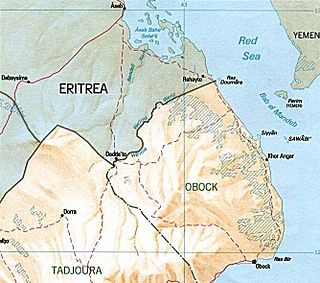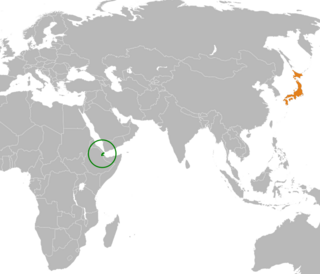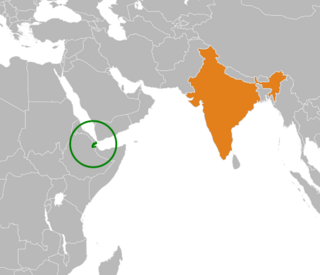Djibouti is a country in the Horn of Africa. It is bordered by Somalia to the southeast, Eritrea and the Red Sea to the north and northeast, Ethiopia to the west and south, and the Gulf of Aden to the east.

The economy of Djibouti is derived in large part from its strategic location on the Red Sea. Djibouti is mostly barren, with little development in the agricultural and industrial sectors. The country has a harsh climate, a largely unskilled labour force, and limited natural resources. The country’s most important economic asset is its strategic location connecting the Red Sea and the Gulf of Aden. As such, Djibouti’s economy is commanded by the services sector, providing services as both a transit port for the region and as an international transshipment and refueling centre.

"Djibouti" is the national anthem of the Republic of Djibouti.

Dileita Mohamed Dileita is a Djiboutian politician who was the Prime Minister of Djibouti from 7 March 2001 to 1 April 2013. He was Vice-President of the People's Rally for Progress (RPP), the governing political party, until 2012. He also served as President of the Union for the Presidential Majority (UMP), the governing coalition. In June 2014, Dileita was appointed as the African Union's Special Envoy for Libya.

National-level elections in Djibouti are held for the President and the unicameral National Assembly.

Djibouti – United States relations are bilateral relations between Djibouti and the United States.

The Djiboutian–Eritrean border conflict between the forces of Djibouti and Eritrea occurred between June 10 and June 13, 2008. It was triggered by tension which began on April 16, 2008, when Djibouti reported that Eritrean armed forces had penetrated into Djibouti and dug trenches on both sides of the border. The crisis deepened when armed clashes broke out between the two armed forces in the border area on June 10, 2008. During the conflict, France provided logistical, medical and intelligence support to Djibouti, but did not participate in direct combat.

Djibouti–Eritrea relations refers to the current and historical relationship between neighboring states Djibouti and Eritrea.

The 2011 Djiboutian protests were widespread demonstrations and riots that took place between January and March 2011 in Djibouti, situated in the Horn of Africa. A member of the Arab League, the protests in Djibouti showed a clear influence from the concurrent Arab Spring protests in North Africa and the Arabian peninsula. The demonstrations ended after mass arrests and the barring of international observers.

All visitors to Djibouti, unless they come from one of the visa exempt countries mentioned below, must obtain a visa on arrival to Djibouti or from one of the Djiboutian diplomatic missions prior to arrival.

Visitors to the Gambia must obtain a visa from one of the Gambian diplomatic missions unless they come from one of the visa exempt countries.

Djibouti–Japan relations are bilateral relations between Djibouti and Japan. Djibouti has an embassy in Tokyo whilst Japan has an embassy in Djibouti City.
The following lists events that happened during 2011 in Djibouti.

Djibouti–India relations are bilateral relations between Djibouti and India.

Azerbaijan–Djibouti relations refers to the current and historical relationship between Azerbaijan and Djibouti. Neither country has a resident ambassador. Both countries are members of the Non Aligned Movement.


















